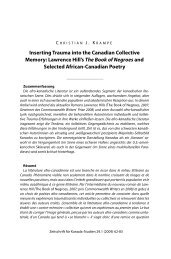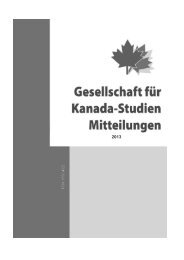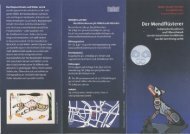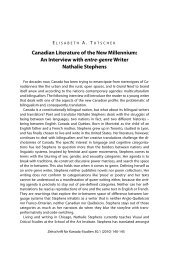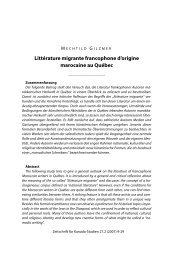The Beginnings of Contemporary Aboriginal Literature in Canada ...
The Beginnings of Contemporary Aboriginal Literature in Canada ...
The Beginnings of Contemporary Aboriginal Literature in Canada ...
Create successful ePaper yourself
Turn your PDF publications into a flip-book with our unique Google optimized e-Paper software.
72 Hartmut Lutz<br />
[…] the deep division between registered and non-registered Indians<br />
cannot be bridged. <strong>The</strong> Métis or non-status Indians also were <strong>in</strong> the<br />
process <strong>of</strong> attempt<strong>in</strong>g to organize. However, their problems and consequently<br />
their aims were markedly different from those <strong>of</strong> the registered<br />
Indians. Métis concerns were largely the responsibility <strong>of</strong> prov<strong>in</strong>cial governments,<br />
whereas the federal government was responsible for status<br />
Indians. Thus, treaty Indians feared that a jo<strong>in</strong>t association with the Métis<br />
would jeopardize their special relationship with the federal government<br />
and, more importantly, endanger their treaty or aborig<strong>in</strong>al rights. (Card<strong>in</strong>al<br />
1969, 115)<br />
Unlike Howard Adams six years later <strong>in</strong> his analysis <strong>of</strong> <strong>in</strong>ternal colonialism <strong>in</strong> <strong>Canada</strong>,<br />
Prison <strong>of</strong> Grass (1975), Card<strong>in</strong>al does not identify colonial imperialism, let alone<br />
capitalism, i.e. the material conditions, as the ma<strong>in</strong> enemy, but rather the <strong>in</strong>dividual<br />
deficiencies <strong>of</strong> “white” ethics, i.e. hypocrisy <strong>of</strong> white rulers, who speak with forked<br />
tongues across what he calls the “bucksk<strong>in</strong> curta<strong>in</strong>”. While perceiv<strong>in</strong>g parallels with<br />
the struggle <strong>of</strong> Blacks <strong>in</strong> the United States, he is not advocat<strong>in</strong>g <strong>in</strong>ternational solidarity<br />
with Third or Fourth World peoples around the globe, but rather limits his<br />
analysis to the relationship between registered Indians <strong>in</strong> <strong>Canada</strong> and adm<strong>in</strong>istrators,<br />
priests, politicians, and educators who deny Natives access to the resources<br />
they were promised <strong>in</strong> the treaties. Even some <strong>of</strong> Card<strong>in</strong>al’s case studies, fictional or<br />
real, tend to uphold the colonial give-and-take relationship rather than advocat<strong>in</strong>g<br />
political radicalism. Card<strong>in</strong>al quotes an anonymous “young chief” who rejects be<strong>in</strong>g<br />
on welfare, because he wants to be a free man. And yet, the young chief rema<strong>in</strong>s<br />
stuck <strong>in</strong> his colonial mentality when he ends his statement by po<strong>in</strong>t<strong>in</strong>g out that<br />
Natives have enough natural resources, but then asks the colonizer for a change <strong>of</strong><br />
advisors and a different type <strong>of</strong> handout:<br />
Why does the government not send us men who would come to teach<br />
us the skills we need to survive <strong>in</strong> the ways <strong>of</strong> the white man? […] Instead<br />
<strong>of</strong> send<strong>in</strong>g us welfare, why does the government not send us the<br />
money to develop the resources that we have here so that people can<br />
make their liv<strong>in</strong>g from the reserves? (Card<strong>in</strong>al 1969, 63)<br />
This is a plea for adm<strong>in</strong>istrative reforms to extend the niche provided, at least on<br />
paper, for registered Indians with<strong>in</strong> Canadian society. It is not a vision or an appeal<br />
for radical change, but rather rema<strong>in</strong>s, however well argued, an “Indian lament”. 8<br />
8 Harold Card<strong>in</strong>al’s later book, <strong>The</strong> Rebirth <strong>of</strong> <strong>Canada</strong>’s Indians (1977) rema<strong>in</strong>s similar <strong>in</strong> style and<br />
political agenda. When compared to later texts by Adams, Armstrong, Campbell, LaRocque, or<br />
Maracle, the moderateness <strong>of</strong> the reformist approach <strong>in</strong> <strong>The</strong> Unjust Society becomes even more<br />
obvious.



